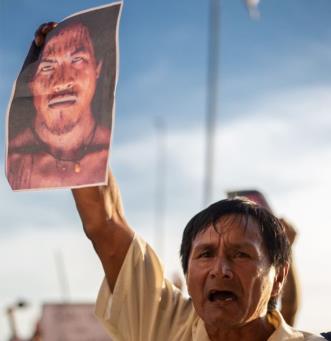This month we have good news from Colombia and Brazil. However, we report on the victims of the ongoing conflict in Colombia, and the staggering violence in Brazil’s Amazon as well as police killings across that country. We focus on the challenge to Colombia and Brazil on the arrival of large numbers of refugees from Venezuela, and update the human rights situation in Venezuela and Chile.
COLOMBIA
Good news! President Duque has publicly stated that Colombia will sign the Escazú Agreement. The Escazú Agreement is a new treaty that deepens the link between environmental protection and human rights in Latin America and the Caribbean. It has the potential to reduce the conflicts that lead to the murders of so many environmental defenders in the region.

The Colombian NGO Somos Defensores (We are Defenders) reports on the increasing aggressions against environmental, territorial and human rights defenders (HRDs). Although the number of HRDs killed in the country fell from 109 to 85 in the first nine months of 2019, the number of aggressions – principally death threats – increased from 448 to 715. Once again community leaders were the main target including indigenous and Afro-Colombian leaders. The main perpetrators were paramilitaries, followed by FARC dissidents, the ELN guerrillas and the Armed Forces.
The Internal Displacement Monitoring Centre records the forcible displacement of 6,200 people in the 4 weeks ending 7 December. These include indigenous and Afro-Colombian communities who were fleeing the ongoing conflict in rural Colombia. In the first half of 2019, 39,000 people were forcibly displaced by armed groups of paramilitaries, FARC dissidents, ELN and ELP guerrillas.
President Duque, in an attempt to stop the infighting among the Army high command, has relieved General Nicasio Martinez Espinel, the Army chief, whose appointment surprised many observers. Martinez has been linked to human rights abuses, including the ‘false positives’ scandal of extrajudicial executions, and he has been accused of corruption.
Colombia Reports explains why it is so hard for the ELN (National Liberation Army) to negotiate peace with the Colombian government. The article gives the background to a situation where several ELN war fronts act independently, leaving the Central Command with little authority to negotiate peace. A map of where the ELN War Fronts operate shows that it is fighting over about one quarter of the country.
A recent Colombian government White Paper (Colombia and the Migration Influx from Venezuela) aims to systematise the reception of 1.8 million refugees from Venezuela. 400,000 are returning Colombian nationals and 1.4 million are Venezuelan citizens. 740,000 Venezuelans have been regularised, while 660,000, mainly those who entered the country via uncontrolled pathways, are in legal limbo. The paper covers the humanitarian response (healthcare, education and protection for vulnerable people), security, economic integration and the huge cost to the nation. The Colombian government commissioned a report by Oxford University’s Refugee Study Centre. This underlines the challenges faced by Colombia as well as the opportunity of incorporating Venezuelans into the local economy. The country is in desperate need of international aid.
BRAZIL
An American Quarterly report points to staggering violence in the Amazon, showing 2,500 separate violent incidents targeting environmental defenders. Since coming into power in 2019, the Bolsonaro administration has systematically deregulated protections of indigenous reserves and reduced spending on public entities like the Institute of the Environment and Renewable Natural Resources (IBAMA) and the National Indigenous Fund (FUNAI).
Reuters reports that Brazil’s indigenous affairs agency Funai have stated that a member of the indigenous Guajajara group has been murdered in the north-eastern Maranhão state of Brazil, the fourth such killing in the past six weeks. Dorivan Soares Guajajara was “brutally assassinated” along with another non-indigenous man, Roberto do Nascimento Silva. Funai said that local police had dismissed links to land disputes or illegal logging operations in the state, as well as any ethnic motivation, although the location of the crime is near where two other members of the Guajajara were killed six days ago in a drive-by shooting.

That double assassination followed the killing in early November of Paulino Guajajara, a leader of a vigilante group created by the Guajajara to protect the forests from illegal loggers.
The New York Times reports that police killed an average of 17 people every day in Brazil last year, and rogue officers are killing even more off duty. On 19 May 2019 in Belém, the capital of Para State, masked gunmen were responsible for a massacre at Wanda’s Bar where 11 people were killed. The killings drew national attention to the police militias that have long plagued Belém. Part death squad, part criminal enterprise, their ranks are filled with retired and off-duty police officers who kill at will, often with total impunity. What made the Wanda’s Bar case stand out beyond its brutality was that the government decided to prosecute seven people, four of them off-duty police officers, including the three suspected gunmen.
Good news! UNHCR (the UN Refugee Agency) welcomes Brazil’s move to recognise thousands of Venezuelan asylum-seekers as refugees on a prima facie basis. Some 21,000 Venezuelans in the country immediately benefited from the decision on 5 December by Brazil’s National Committee for Refugees.
From now on, asylum claims from Venezuelans who fulfil the necessary criteria in Brazil will be processed through an accelerated procedure, without the need for an interview. To benefit from the new provision, Venezuelan asylum seekers must be living in Brazil, not hold any other residence permit in the country, be over 18, possess a Venezuelan identity document, and have no criminal record in Brazil. An average of 500 Venezuelans are continuing to cross into Brazil every day, mostly into the northern and isolated state of Roraima.
However, Human Rights Watch reports that the Brazilian authorities are failing to provide adequate protection for hundreds of unaccompanied Venezuelan children who are fleeing into Brazil. From May 1 through November 21 2019, 529 unaccompanied Venezuelan children crossed the border into the Brazilian state of Roraima, according to the Brazilian Federal Public Defender’s Office. Almost 90 percent of them were between the ages of 13 and 17. They had either travelled alone or with an adult who is not a relative or legal guardian. The total number is most likely higher, as some children may not stop at the border post where the public defenders conduct their interviews. No system exists to track and support unaccompanied children after their entry interview. “The humanitarian emergency is driving children to flee Venezuela alone, many looking for food or health care,” said César Muñoz, senior Brazil researcher at Human Rights Watch.
CHILE
The Office of the UN High Commissioner for Human Rights has published a report on its findings following its recent research mission to Chile. The report found that international human rights norms were violated by both police and army personnel during the mass protests in the first three weeks of November and called for those responsible to be prosecuted. The report contains multiple allegations, including torture, rape and other forms of sexual violence by the police against people held in detention. Although the great majority of detainees have now been released, official figures revealed that more than 28,000 people were jailed between 18 October and 6 December, many arbitrarily.
VENEZUELA
The UN Human Rights Council has announced the appointment of three investigators who will serve on its Fact-finding Mission on Venezuela. The development is in line with the Council resolution in September urgently to dispatch a mission to Venezuela “to investigate extrajudicial executions, enforced disappearances, arbitrary detentions and torture and other cruel, inhumane or degrading treatment since 2014 with a view to ensuring full accountability for perpetrators and justice for victims”.
The trial of Juan Requesens, opposition politician, member of the National Assembly and the subject of an Urgent Action last month, finally began on 2 December after several undue postponements. The Urgent Action has been suspended and Amnesty will now focus on documenting his case in depth to continue campaigning on his behalf.
All the best for the New Year,
South America Team – Richard Crosfield (Colombia, Argentina), David Palmer (Brazil) and Graham Minter (rest of South America).